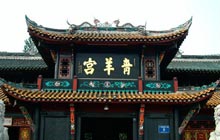
 Qingyang Temple , which literally means Temple of the Dark Ram, is the most exquisite and active Daoist temple in Chengdu . The name is associated with many myths, such as Laozi (the mythical founder of Daoism) claiming that he would be reborn in a market where dark rams were sold, to a meeting of Daoist luminaries at which some dark rams were seen. Whatever the truth of the name, it was acquired in the ninth century after some remarkable phenomenon led to the unearthing of a box which contained a seal on which ancient characters with a Daoist message were carved. The temple has halls devoted to a number of luminaries in the Daoist firmament including Lao Zi, one of the trinity of the highest deities in Daoism; but also features halls with the Jade Emperor who ranks as the senior of the Heavenly Emperors, and other lesser deities. If you see religious or spiritual activities taking place that you might think belong elsewhere do not be too surprised. While Daoism does have its own gods and texts it has always been more open to other influences and will absorb ideas we might otherwise associate with Confucianism, Buddhism, or folk religion much more easily than other creeds will.
Qingyang Temple , which literally means Temple of the Dark Ram, is the most exquisite and active Daoist temple in Chengdu . The name is associated with many myths, such as Laozi (the mythical founder of Daoism) claiming that he would be reborn in a market where dark rams were sold, to a meeting of Daoist luminaries at which some dark rams were seen. Whatever the truth of the name, it was acquired in the ninth century after some remarkable phenomenon led to the unearthing of a box which contained a seal on which ancient characters with a Daoist message were carved. The temple has halls devoted to a number of luminaries in the Daoist firmament including Lao Zi, one of the trinity of the highest deities in Daoism; but also features halls with the Jade Emperor who ranks as the senior of the Heavenly Emperors, and other lesser deities. If you see religious or spiritual activities taking place that you might think belong elsewhere do not be too surprised. While Daoism does have its own gods and texts it has always been more open to other influences and will absorb ideas we might otherwise associate with Confucianism, Buddhism, or folk religion much more easily than other creeds will.
The Temple has a public sphere and a more private section where the monks live and practice. The grounds are well-manicured and extensive, and most of the present buildings in the complex date back to the seventeenth century. You can begin your visit with a rub of the ram statue for good luck and then go through to the main halls of worship. To get a good feel for how Daoist philosophy and indigenous Chinese folk religion are all mixed here together don't miss: the signs of the eight trigrams on the Bagua Ting (Pavilion of the Eight Trigrams); the 81 dragons referencing Chinese numerology; and the worshippers in the main hall shaking stalks out of a wooden cone. Once a stalk falls out, the worshipper takes it to a side room where a Daoist Priest exchanges it for an appropriate reading to the silent question the worshipper has asked. If you're feeling lucky then shake a stick yourself or try to throw some coins onto your Chinese zodiac sign.
In addition to the wide-ranging philosophical and folk references within this sanctuary of Chinese thought, there is an impressive array of traditional Daoist activities. Alchemy, once hotly researched here, is related in its exploration of physical and biological laws to the temple's long-standing traditional Chinese medicine practice. The benefits of meditation are combined with precise muscular control in the artful exercise of taiqi as taught by the temple's resident master. The temple's tea ceremony is refined and developed in the same room used by its Daoist orchestra. The combination of richly varied ideologies, images, practices and arts seen in a visit to the Qingyang Temple feels like a celebration of some of the most original and intriguing aspects of traditional Chinese culture.